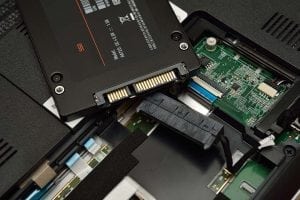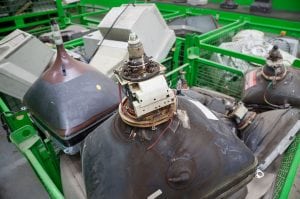 Solid state device data erasure is slated be added to the National Association for Information Destruction (NAID) certification standard.
Solid state device data erasure is slated be added to the National Association for Information Destruction (NAID) certification standard.

 Colin Staub was a reporter and associate editor at Resource Recycling until August 2025.
Colin Staub was a reporter and associate editor at Resource Recycling until August 2025. Solid state device data erasure is slated be added to the National Association for Information Destruction (NAID) certification standard.
Solid state device data erasure is slated be added to the National Association for Information Destruction (NAID) certification standard.
 The Basel Action Network (BAN) announced today that all companies certified to BAN’s e-Stewards standard will also be required to maintain certification with the National Association for Information Destruction (NAID).
The Basel Action Network (BAN) announced today that all companies certified to BAN’s e-Stewards standard will also be required to maintain certification with the National Association for Information Destruction (NAID).
 An e-scrap processor has completed a $19 million update to its headquarters, adding a facility that began operating last month.
An e-scrap processor has completed a $19 million update to its headquarters, adding a facility that began operating last month.
 An upcoming South Carolina processing facility will handle CRTs, circuit boards, scrap plastics and more, a company leader has confirmed to E-Scrap News.
An upcoming South Carolina processing facility will handle CRTs, circuit boards, scrap plastics and more, a company leader has confirmed to E-Scrap News.
 Apple shows signs of loosening the requirements to operate a repair center, and the latest iPhone has been ranked for repairability.
Apple shows signs of loosening the requirements to operate a repair center, and the latest iPhone has been ranked for repairability.
 Proposed changes to international fire regulations could impact e-scrap and ITAD companies by requiring new lithium-ion battery storage procedures.
Proposed changes to international fire regulations could impact e-scrap and ITAD companies by requiring new lithium-ion battery storage procedures.

The bankruptcy of a major e-scrap processor – and wider market conditions – led a Goodwill affiliate in Oregon to stop accepting most end-of-life electronics.
 A growing threat in the e-scrap sector received national analysis this week, when The Washington Post visited a processing facility and explored the danger of lithium-ion battery fires.
A growing threat in the e-scrap sector received national analysis this week, when The Washington Post visited a processing facility and explored the danger of lithium-ion battery fires.
 A partnership between a processor and a prison in the U.K. is training inmates in dismantling electronics within the prison walls.
A partnership between a processor and a prison in the U.K. is training inmates in dismantling electronics within the prison walls.

Green Tech Solution is developing a recycling facility in Blacksburg, S.C.
A Chinese investment firm is planning a $75 million recycling plant to process e-scrap, plastic and other materials.
